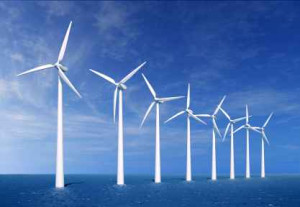This project certainly isn’t small-scale! Imagine a turbine, taller than the Statue of Liberty. Then imagine a curve of them stretching for 25 miles around an area of Nantucket Sound called Horseshoe Shoal, some 5 miles off the coastline. It could supply three quarters of the needs of Cape Cod and neighbouring islands. Fantasy? It obtained a federal permit from the Interior Department in April 2010, setting it up to be the US’s first offshore wind farm.
Under a 15-year contract, Cape Wind would sell half of the farm’s power to National Grid. The recent approval of the contract was one of several regulatory hurdles remaining. The contract is, of course, pivotal in attracting investors, as well as in gaining federal incentives such as tax credits or loan guarantees.
Simulation of the wind farm viewed from the nearest shoreline
Without a yes verdict, it could have been the end of the proposed $2 billion project. The decision hinged on whether the project is “cost-effective” and “reasonable” under a 2008 Massachusetts law called the Green Communities Act. And as you might think, those phrases were open to interpretation.
There is both strong support and opposition to the project. Opponents of the wind farm have vowed to go to court, potentially stalling Cape Wind for several more years- but in a recent decision, the Court upheld the contract and things are moving forward again. Opponents’ arguments were that the venture is too expensive and would interfere with local fishermen. Also that the turbines would intrude on the sacred rituals and submerged burial grounds of two local Indian tribes. And finally that it would destroy the view from the coast.
Supporters of the project, which include major environmental organizations like the Sierra Club and Greenpeace, are well organised and have a vibrant and up-beat website. They point to a consulting firm hired by Cape Wind’s developers, suggesting that the project could save New England ratepayers $4.6 billion in energy costs over 25 years. They also say that the project has undergone two separate environmental impact analyses, neither of which found significant downsides.
An innovative move was to have installed a meteorological antenna at the site, to show what energy would have been created, and how much carbon would have been avoided if the project was operating. Currently, if Cape Wind were operational since the start of monitoring, 14,149,293 cumulative MW hours or renewable energy would have been created, and 7,331,64 tons of CO2 offset. Proponents have also encouraged the local community to actively support the Project, and these have included painting and drawing competitions for the children:
The location for the project seems ideal. It has strong, consistent winds; is located in protected shallow water; has close proximity to landfall and electrical interconnections; and is out of way of shipping lanes and commercial boating traffic. Unlike previous generations of wind turbines, Cape Wind’s turbines will be very quiet close up; from the land they will not be audible at all. The turbines and generators have no effect on TV, radio or cell phone reception. Although the turbines will be lit—for aviation and boating safety—these lights are only visible for a few miles. Construction will begin in 2013. Once commissioned, the project has a guaranteed lifetime of 25 years, after which it will be de-commissioned.










